| July 2000 Film Music CD Reviews | Film Music Editor: Ian
Lace Music Webmaster Len Mullenger |
|
index
page/monthly
listings/July/
 For
those wishing to print these reviews without CD cover graphics
there are scrolling copies available
For
those wishing to print these reviews without CD cover graphics
there are scrolling copies available
Month by Month
index Alphabetical composer
index
© Film Music on the Web 2000.
All rights retained.Reviewers retain copyright on their
reviews.
Return to the July Index with thumbnails Part 3 [Part 1] [ Part 2] [Part 3] [Part 4]
CDs may be purchased from the retailers listed at the bottom of the page with a saving of around 22% Donations Disclaimer
Richard GIBBS
28 DAYS
OST
VARÈSE SARABANDE VSD 6151 (33.02)
Crotchet Amazon UK Amazon USA
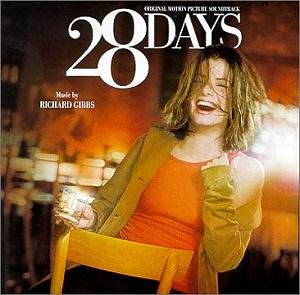
As Richard Gibbs' original work itself is unlikely to inspire too many repeat plays, the emphasis would appear to be more on the songs included here, particularly the currently in vogue Tom Jones' rendition of 'Lean on me'. Unfortunately though I found it all fairly dull with Tom's rather self-indulgent vocal not exactly helping things. But then for fans of the Welsh warbler it will no doubt be a treat!
Gibbs' tracks like 'A Way to Die' reminded me of sub par Tangerine Dream, not exactly poor but hardly compelling, while others were vaguely reminiscent of Thomas Newman's work. Sadly though this composer doesn't quite have the same inventiveness or substance, so perhaps this might best be described as 'Newman lite'.
His more up tempo cues such as 'Ode De Toilet', 'A Dingo Stole my Baby' and 'Fragile Package' are also on the bland side, despite occasional flashes of interest, but his most engaging piece 'Can't Breathe' with its simply constructed dramatic melody and ticking clock effect does provide some brighter moments. This clock device is also heard in several other cues, counting down the 28 days of the title and is a notable feature of the score (and is actually quite effective)
The other major contributor to the CD is singer/songwriter London Wainwright III, who provides several relatively brief folksy ditties like 'The Drinking Song' and 'White Winos' which are pleasant enough in an undemanding way, without making much of an impact.
To supplement the Tom Jones number, 'Joy to the World' performed by Three Dog Night and 'Fa-Fa-Fa-Fa-Fa (Sad Song)' by Otis Redding are the obligatory standards that seem to always feature in these kind of soundtracks. Hardly a reason to buy the CD though.
Certainly not the worst of its kind, but nothing to get excited about.
Reviewer
Mark Hockley

Elia CMIRAL
Battlefield Earth
OST
VARÈSE SARABANDE VSD-6144 [48:54]
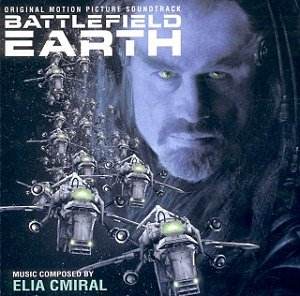
Another summer, another dumb would-be sci-fi blockbuster. It's rumoured that no one ever aspires to make a bad film, but why then start with one of the worst books ever written? Battlefield Earth has proved perhaps the most derided big budget film since Inchon (1982), a war epic vanity project financed by the Moonies. Battlefield Earth is Scientologist John Travolta's long cherished war epic of Scientology founder Ron L. Hubbard's SF novel. It wants to be this year's Independence Day (1996). It is this year's Plan 9 From Outer Space (1958). Unsurprisingly the usual suspects for scoring such a project proved otherwise engaged when their agents received the call, so the task of providing a musical accompaniment fell to the up-and-coming Elia Cmiral.
Cmiral is a Czech composer who has been scoring films for a decade, and writing for the theatre since he was 18, debuting with stage production of Cyrano de Bergerac. Most film music fans probably didn't notice his existence until John Frankenheimer's Ronin (1998). One could hardly fail to notice, as much of the film, which astonishingly survived, proved an earthy battlefield between the director's set-pieces and Cmiral's drum-and-bass 'inspired' score. A contemporary space-opera should have offered the opportunities for something big, bold and thrilling, and the music here that has any sense of melody draws a line somewhere between the portentous choirs of Alan Silvestri's The Abyss and the military might of David Arnold's Independence Day. However, if you have those, you don't need this for they do the job far better.
Meanwhile the vast bulk of this very fragmented - 28 tracks in 48 minutes - everything and the kitchen sink score consists of relentless percussive assaults, atmospheric synthesiser patches and the occasional 'ethnic' voice. It's consistently hyperactive, as if a normal action movie score had been injected with speed then entered into the action movie 100 yard dash. Suffice to say it goes 'bang, crash, thud' a lot and conclusively proves that more is less. The whole thing rapidly becomes incredibly tiresome, with only an attempt at alien pop music 'Psychlo's Top 40' to show how much worse things could get. Or perhaps, as a cure for not having a headache.
With Independence Day and his James Bond scores David Arnold has shown how orchestra, intense percussion and electronics can combine in a modern way and yet remain melodically engaging. Battlefield Earth shows how the formula can go drastically awry. It may be functional in the film, but on disc it offers nothing you haven't heard many times before, and usually in ways which are far better executed.
Reviewer
Gary S. Dalkin
+

Steve WOOD
Dolphins
Soundtrack from the IMAX theatre film
PANGAEA 186 810 057 2 [54:36]
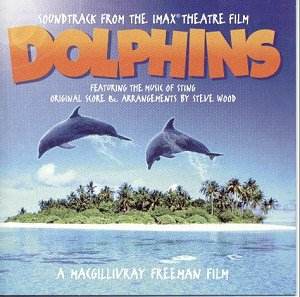
The huge IMAX screen, especially its great height/depth, is ideal for portraying and better understanding the undersea world. Considering the warm playful nature of these delightful creatures, Steve Wood's light-hearted and joyful score is entirely appropriate. The music is easy-going yet strongly rhythmic and it blends the smooth friendly-sounding percussion of the Caribbean Islands with the passionate lively tones of Argentina. In one memorable number Wood and partner Daniel May transform the song, 'Every Breathe You Take' into a dusky dolphin tango for one of the film's mating sequences.
It is nice to hear Sting's intelligent and responsible songs incorporated in the score -- it will be remembered that he has long used his celebrity to help protect the earth's resources.
The lavish booklet includes notes on the production of the film, notes on Wood's music and that of Sting and a plea to us all to help save the Dolphins and the environment.
As a souvenir of the film or as a pleasant easy listening experience, this album succeeds
Reviewer
Zara.

Ennio MORRICONE
Quando Le Donne Avevano La Coda (When Women Had Tails)
Bruno NICOLAI
Quando Le Donne Persero La Coda (When Women Lost Their Tails)
Double Soundtrack CD CAM 495375 -2 [45:21]
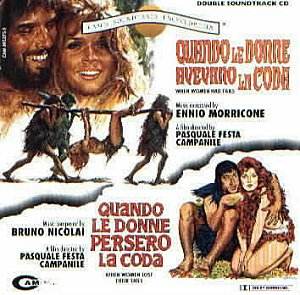
The rating for this double soundtrack suggests these are average scores. Please remember that the powers of suggestion are often false.
Ennio Morricone's comedic "Quando Le Donne Avevano La Coda" makes absolutely no sense and is positively dazzling about it. One hears the trademark audacity of the composer in an insane surplus. The music seems to have no idea of exactly where it wishes to be, but sounds very determined to exhibit wherever it is. I therefore challenge anyone to explain to me the musico-dramatico significance of combining primitive vocals merged with 1970s technique, a jocund main theme that pops up anywhere (anytime, anything), all sorts of oddball orchestrations, a playful violin, a cancan, and something that sounds strangely like a variation on 'Twinkle, Twinkle, Little Star.' That's for starters.
But Morricone severely overextends his musical slapstick, further draining his score of understanding, and defying listeners' senses. The novelty and the lunatic genius behind it must be heard to be believed, hopefully even admired, but once the novelty wears thin all we are left with is the shadow of a composer who wrote better scores before and has since. Despite the amusing permutations, that essential, sought-after timelessness of filmusic is far removed.
Bruno Nicolai's sequel score, "Quando Le Donne Persero La Coda," is slightly more coherent, and brings some closure to the earlier score's residual dementia. This also means it is considerably less interesting. Morricone has had problems following in his own footsteps, so no surprise when Nicolai fails to recapture the innovation of the original, much less match Morricone's métier. What it has is period weirdness.
There is a saying that goes, "If it is in the music, it is in the man." Were this album a pure example of its creators, a set of designer straitjackets would be in order. Perhaps something mauve.
Reviewer
Jeffrey Wheeler

Ian Lace adds:-
Here is evidence of another facet of Morricone's versatility. Here he writes with tongue firmly in cheek. Considering the farcical story line, he comes up with an appropriately whimsical score with the sort of material you would expect; music suggestive of the primitive and clumsy gait of the stone age man complete with grunts and groans and softer more sighing tones of the females bent on ensnaring their unwary mates and propagating the species. Morricone uses the form of the bossa nova that was fashionable when the movie was made back in 1970 -- with a mix of waltzes. His orchestrations are witty and imaginative including the use of didgeridoo, wooden blocks and tubas as well as low woodwinds to suggest the cavortings of the ape men. Music suggestive of the slapstick silent film comedies is also used to good effect and innocent romance is conveyed by a mix of harpsichord, pipes and triangle. A charming if rather repetitive score. The short suite of Nicolai music is really an extension of the Morricone score with very little added.
Reviewer
Ian Lace

Luis BACALOV
Il Cielo Cade
CAM CAM 498374-2 [42:55]
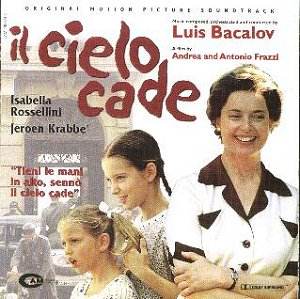
This novel adaptation deals with a family's existence within and without the encroachment of WWII on their lives within sunny Tuscany. Through the whole album, there is only 1 minute long suggestion of the war machine - a minor rumbling in "La villa invasa". Otherwise this disc is as gentle as a puppy.
Bacalov's piano leaves its mark with plenty of solo attention - certainly in the classics slotted into the background (Mozart, Beethoven, and Chopin). The other major make-up comes from violin solo passages (e.g. the gorgeous "Da lontano variante I"), children's choir ("Divertimenti infantilli"), and a keyboard almost emulating harpsichord ("Mesti pensieri").
Even though a little mournful at times, the overall sense is of familial strength and
survival.
Reviewer
Paul Tonks

Giovanni VENOSTA
Pane E Tulipani
CAM CAM 498300-2 [33:06]
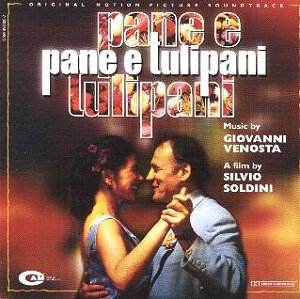
This sweet story of friendship takes place in Italy, with an important excursion to Venice where the central character rediscovers her love of accordion playing. That might well have been the earliest 1 line pitch Venosta was given, and should quickly paint a picture for you as to what he came up with.
The intimacy and geography would almost be sold out without: acoustic guitar, viola, mandolin, and naturally the accordion. Even the sourced tracks accord to the feel-good formula. There's a little Rossini and an "Eclisse Twist" from G. Fusco for instance.
If only for the slinky brushed drums of the opening "Bread & Tulips Shuffle" this is an album worth opening a bottle of red wine to.
Reviewer
Paul Tonks

Collection : REEL LIFE:
The Private Music of Film Composers, Vol. 1
David RAKSIN; Bruce BROUGHTON; Michael KAMEN; Rachel PORTMAN, Howard SHORE, Bob JAMES.
Music Amici
ARABESQE Z6741 (69:17)
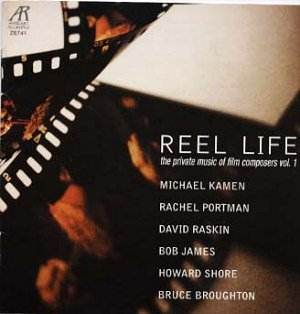
This album perhaps more appropriately should be reviewed on the classical music side of this Web site, but the six composers featured here are of particular interest to fans of film music. Though their efforts are not limited to composing for films, that is where Raksin, Kamen, Shore, Portman and Broughton are best known. (I would not say quite the same for James, whose work is the first heard on this recording, but the point is made.) As such, this is something of a "concept" album -- but what a concept! Many of us are familiar with the concert works of such film notables as Bernard Herrmann, Miklos Rozsa or Franz Waxman, but the vast repertoire of non-film works by otherwise well-known film composers remains largely unrecorded and thus unknown to their many admirers.
And this immediate note to those fans: The compositions featured on this disc are not large orchestral works such as film scores usually offer. Reel Life features eight compositions written for chamber orchestra, each enjoying its premiere recording by the eight-member Music Amici. While far from avant garde, none of the works offers the motific immediacy -- much less the dramatic bombast -- that make film music so readily enjoyable.
Nevertheless, there are gems herein, made all the more interesting because they display a side of these composers we might otherwise not see. Still, like a film score, several of the pieces are at least slightly programmatic, such as Kamen's 'Cut Sleeves,' which depicts an ancient Chinese legend of an emperor who slit his bed dress so as not to disturb his young lover when forced to leave their bed to attend to state matters. Kamen uses the oboe to introduce his theme, adroitly joining it with flute, cello and harp to weave this musical tale -- which, by the way, was Kamen's first professional composition as a non-rock musician. At more than 11 minutes, it's the longest single piece on Reel Life, apart from a five-movement work by Broughton. The piece is marked by a sharply lyric fluidity, particularly in its first half.
My favorite piece -- and perhaps the most immediately accessible on this disc -- is the first of two by Portman: her 6-minute 'Rhapsody' which she wrote for a friend's wedding in 1994. Softly pastoral in its tone, 'Rhapsody' opens with piano voicing a sense of yearning which is then picked up by violin and clarinet in succession, each building on the same sense of yearning which evolves, as the trio join, into one of fulfillment. (What a wonderful wedding gift -- and how sad that we had to wait this long to hear it!)
Portman's second work, 'For Julian,' is a memorial in solo piano for her young friend, Julian Wastall, a composer whose work for film and TV may be better known to British readers of this Web site than to me. Portman's contemplative piano effortlessly combines a feeling of both questioning and acceptance, leaving the listener with a sense of loss at its ending.
Raksin's contribution to Reel Life, 'A Song After Sundown' (the title is a takeoff on a work by Delius) actually was used in a film - the 1962 Too Late Blues, albeit as a vocal in a larger jazz arrangement. Heard here in chamber form by Music Amici, its bluesy nature remains unmistakable. By itself, this may be worth the price of the CD.
Like Portman, Shore s represented by two pieces -- 'Hughie' and 'Piano Four' -- each is among the more abstract works on this recording. The former is a musical portrait of the title character of a Eugene O'Neil play, the latter described by the composer as "a brief statement for the end of the Millennium."
Easily the most ambitious work is provided by Broughton, with his 21-minute, 5-section 'A Primer for Malachi.' Written for the impending birth of the composer's grandson, the piece moves without interruption through various stages of life under the following headings: Flowing, Faster, Rhapsodically, Very Quick, Very Calm. The first opens with flute, cello and clarinet encircling each other in a vain search for unity, The pace picks up in part two, led by a piano as each instrument begins to speak with more self-confidence, if not the still sought-after coherence of maturity. Broughton tosses thematic ideas out seemingly at random here, experimenting, rejecting, and again revisiting various concepts. Throughout this and the next section, Broughton continues his search for musical cohesion and order, not unlike a young man struggling to find his way in life. This begins to assert itself in part four, followed by a more tranquil maturity, finally, in the aptly titled final section.
Reel Life opens with 'Odyssey,' a piano-flute duet by jazz keyboardist James, whose primary Hollywood connection is the catchy title theme to the U.S. TV series Taxi. The piece opens explosively with both instruments boldly declaring themselves and then just as quickly turning tentative, as if suddenly self-conscious in each other's presence. The piano eventually steps forward, followed by flute as the two begin a spirited dance, each taking turns at leading.
I can't praise too highly the overall effort by Music Amici and its director, violinist Marti Sweet. Reel Life is a product of the efforts of Michael Whalen, Marvin Reiss, Jonathan Schultz and Charles Yassky, the latter also performing on the violin. The sound is crisp and intimate, as a chamber work necessarily must be. Bravos all around. I hope volume II isn't far behind.
Reviewer
John Heuther.

Richard HOROWITZ
Any Given Sunday
OST
PROMO RH CD 01
How to get copies of promotional discs
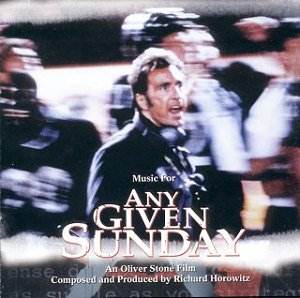
In close succession we are offered Hans Zimmer's electronics for Gladiator, and Richard Horowitz electronics for American football movie Any Given Sunday, intended by the director Oliver Stone to 'reflect the ancient soul of the film', 'the mythological souls of his modern gladiators.'
Oliver Stone is one of those rare directors who pushes the form of commercial cinema to the limit, and his use of music has ranged from era-defining pop, to outstanding scores from John Williams for Born on the Fourth of July, JFK and Nixon. Stone decided to try something very different with Any Given Sunday. The 'score' if such it can be called, is a vast patchwork of rap - two albums, one with swearing, one without, have already been issued - and work by a wide range of other composers, Richard Horowitz just being one of nine. There are copious notes by Horowitz included with this disc, which necessarily concentrate almost exclusively on his part in scoring the film, though an excellent article by Jeff Bond in Film Score Monthly (Vol 5, No. 2) puts the whole complex process in context. Horowitz notes are exuberant, deeply personal, arguably pretentious, and include a letter to Stone which it is simply astonishing.
A huge amount of work and intellectual effort has been put into conceptualising this score. This is meant to be considered art, shame then that a director who understands so well how music can work to enhance the emotional power of film, that Stone should be satisfied with this end result. Clearly this is the same Richard Horowitz whose music worked well as extra material in The Sheltering Sky and 1492: Conquest of Paradise, though here while still often derived from ethnic rhythmic devices, the scoring is largely synthesised. The sad fact is that it all boils down to 'dance music'. Only the opening 'Final TD' - presumably from near the end of the film, has any sense of mythological destiny - and that in a very modern, digitised idiom.
For 40 tracks, loop follows loop. There are atmospheric patches. And loop follows loop - a relentlessly turgid machine with no clear end in view - as the composer's notes essentially point out. He improvised/wrote hours of this stuff, and Stone mixed and matched as his team of editors edited and edited and re-edited his million and a half feet of film, attempting to find a film out of the chaos of what appears to have been a project close to being out of control. The resultant CD is the sort of thing anyone familiar with MIDI can assemble with a decent synthesiser, some 'world music' samples, a digital reverb unit and a sequencer. There are no worthwhile themes, only loops, riffs and beats. At normal volume it is all but unlistenable. A aggressive cacophony that may well be appropriate to the undeclared war that is American football. Even so, it is without a doubt the worst film related release I've heard so far this year.
Reviewer
Gary S. Dalkin
+



Combined Book and CD Review
The Book: - Saving Grace by Tom McGregor
(based on the screenplay by Craig Ferguson and Mark Crowdy);
Harper Collins Entertainment (paperback)
250pp ISBN0-00-710711-0 £5.99
Amazon UK (£4.79)
The Soundtrack CD: -
Mark RUSSELL and source music
Saving Grace
with dialogue from the film
WEA 8573830952 [53:49]
Crotchet Amazon UK Amazon USA
After years of peace cultivating orchids in the greenhouse of her large country house, middle-aged widow, Grace, learns that her husband has thrown himself out of an aeroplane leaving her without money or house, but with vast debts through ill-advised business ventures. Grace desperate to save the house she loves resorts to illicit use of her 'green fingers' growing cannabis on a vast scale aided by her somewhat dim young gardener Matthew whose expectant girlfriend Nicky is understandably miffed at the idea of her provider ending up in the nick. This farcical situation with half the characters high on cannabis half the time is slow moving until Grace tries to off-load her crop in London where with the help of her husband's former mistress she meets some shady underworld characters who pursue her back to Cornwall. The screwball comedy that ensues is more frenetic than funny and the book's swift throwaway conclusion is something of a dopey (if you will excuse the dreadful pun) copout.
The CD is a curious mix of pop styles with three or four excerpts from the dialogue - for instance when the news breaks of Grace's husband's death from a great height, somebody comments, "Maybe he was looking for the bathroom and picked the wrong door!?!". There is one attractive piece of instrumental music at the beginning of the disc, featuring a solo violin in Vaughan Williams Lark Ascending mode with a muted string background that suggests the serenity of the life that grace was used to before calamity overtook her.
Book and CD

Ian Lace

 |
| Discs
on these pages are offered for sale. There is also a page of search
engines from a selection of on-line retailers
here.
Please support this web-site by buying your discs here. Disclaimer: Every effort is made to make sales links to the correct disc but, in the end, you must take responsibility for checking that what you are purchasing is what you want. Some of these discs were not actually available for sale at the time of posting but a link has been made in anticipation of their forthcoming availablility. |
Return To Film Music on the Web
e-mail: info@musicweb.uk.net